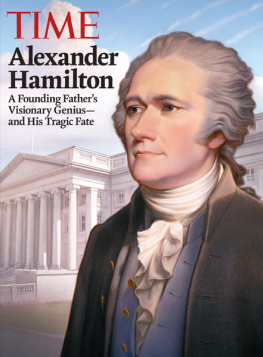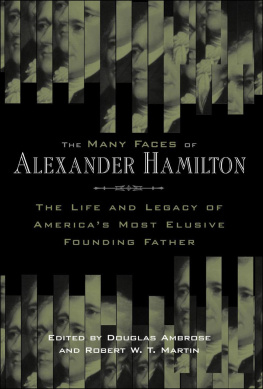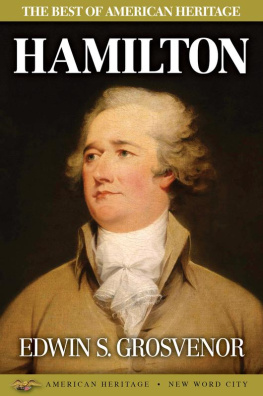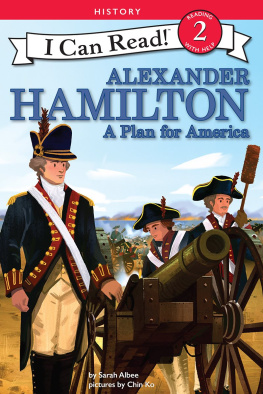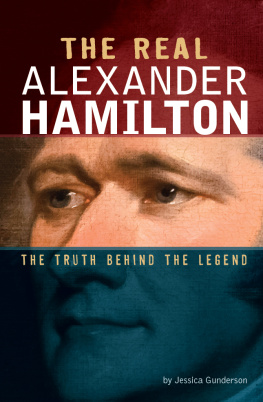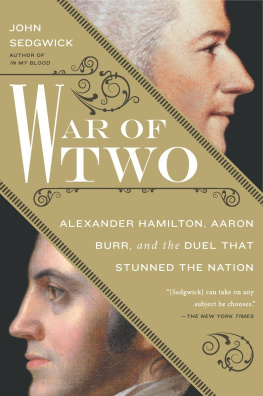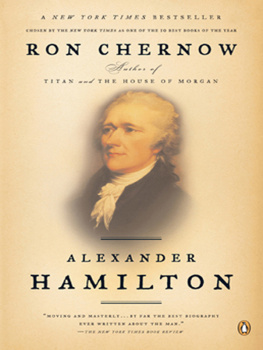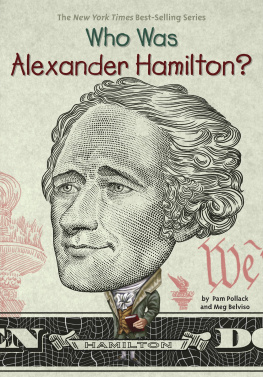Contents

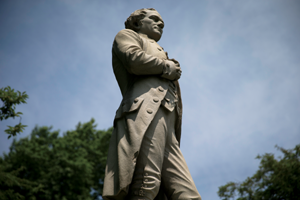
A CENTRAL FIGURE From humble beginnings, Alexander Hamilton grew to play a crucial role in laying the groundwork for the United States of America.

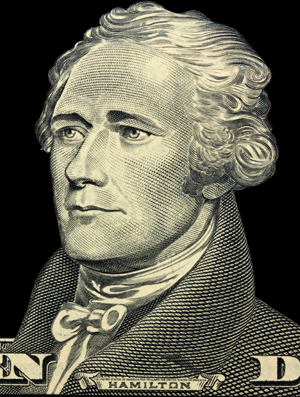

ALEXANDER
HAMILTON
A Founding Fathers
Visionary Geniusand
His Tragic Fate
INTRODUCTION
THE VISION AND PASSION OF A COMPLICATED FOUNDER

BY JOANNE B. FREEMAN
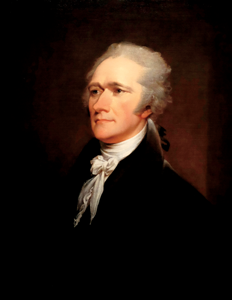
UNCOMMONLY CANDID Hamiltons willingness to speak his mind made him an effective if polarizing figure.
ALEXANDER HAMILTON IS A PROBLEMATIC founder. A power and a prodigy with a self-destructive streak, he was a notoriously difficult man of extremes. Always sure that he was right, he charged headfirst into battles with nary a look back, sometimes with disastrous results. Desperate to make a name for himself and equally desperate to destroy defamers of that name, he entangled himself in countless disputes; he was involved in 10 affairs of honor before his fatal duel with Aaron Burr. Powerhouse that he was, Hamilton was often his own worst enemy.
Yet theres no denying his Founder status; he had an enormous shaping influence on the young United States. A fervent nationalist and the countrys first secretary of the Treasury, he brought order to the new republics finances, earned it credit at home and abroad and strengthened the national government, setting constitutional precedents that persist today.
To some degree, Hamiltons policies and personality were of a piece. He dedicated his considerable energies to the establishment of energetic governance; indeed, energy and method were watchwords of both his politics and his life. A skilled wordsmith, he poured himself into his writings, defending the Constitution, the national government and his reputation with like fervor. In moments of crisis, though, Hamilton could push too hard, say too much and compromise too little. More than once, he favored military solutions to domestic crises in the hopes of quashing resistance to government authority. He responded similarly to attacks against his character, launching affairs of honor or doing battle in print. Discomfited by the rumblings of democracy and intolerant of opposition to his policies, he spent his life imposing order as he felt it should be.
Thus Hamiltons complicated and conflicted life. One of the nations most powerful men by the age of 34, he was a political has-been a decade later, destroyed by his passions. Yet even his excesses served a purpose. In the confusion of the republics founding, with no precise model to follow, Hamilton declared himself the man with the answers, proposing bold policies and challenging expectations. As polarizing as his politics wereand indeed, they divided the countrythey triggered a conversation about the nations destiny. In the push and pull of devising a government, someone had to start things off and stake a claim. Hamilton was that man.
In a sense, Hamilton had been training for that moment for decades. Born poor and illegitimate in the West Indies and orphaned at a young age, he escaped from obscurity by displaying his talents. Impressed by the young mans writerly flair, some locals raised charitable funds to send him to the North American colonies for a proper education. Arriving in New York in 1772, as the Revolution was brewing, Hamilton was swept up in the furor, becoming an ardent pamphleteer, a soldier yearning to commit acts of derring-do and, ultimately, one of Commander in Chief George Washingtons aides-de-camp.
Hamiltons quick wits and nimble writing made him invaluable at headquarters, but he wanted more. With little money, few connections and no family to fall back on, he was desperate to earn a name for himself on the battlefield, and he got his chance at Yorktown in 1781. But his relationship with Washington proved far more valuable. Working at the generals side in the crisis of war, Hamilton gained his trust and support, the all-important anchor of his political career.
But Hamilton didnt place all his bets on Washington. He wrote lengthy letters to men of influence, filled with advice for strengthening the government and salvaging its finances. Even before the war was over, Hamiltons core precepts were in place, and he wasnt shy about promoting them; he was one of the nations first and most insistent nationalists. Hamiltons other wartime investment in his future was his marriage to Elizabeth Schuyler. The daughter of the wealthy Philip Schuyler of New York, she would be a vital source of stability for Hamilton throughout the rest of his life.
THE FEDERAL CONVENTION of 1787 must have seemed like a dream come true to Hamilton, who by then had been arguing for a stronger national government for nearly a decade. As one of New Yorks three delegates, he finally had the power to effect change. Or so he thoughthis politically cautious New York colleagues consistently outvoted him. Still, he had his say in a grandstanding six-hour speech on June 18, proposing a plan of government so extreme in its centralized authority that it branded him a monarchist, a charge that he refuted to the end of his days. His work during the ratification debate was more fruitful; he invited James Madison and John Jay to join him in writing a series of newspaper essays defending the proposed Constitution. Although many of those essays were first drafts rushed to press, The Federalist became a key political text with the launching of the government, and it remains so today.
In September 1789, President Washington made Hamilton the nations first secretary of the Treasury, starting Hamiltons peak years of power. Entrusted with bringing order to the nations chaotic finances, he had bigger ambitions, taking full advantage of the unstructured new government to advance public policy. He envisioned a nation fueled by industry, with a strong national government directed by a strong executive and stabilized by the support of the rich and powerful. He promoted this vision with a financial plan that included the national assumption of state debts incurred during the Revolution, the establishment of a national bank and the encouragement of manufacturing. Faced with resistance to his bank proposal, Hamilton argued for a broad construction of the Constitution that profoundly shaped the nature of national governance from that time forward.
In an agrarian nation of loosely linked states that jealously guarded their independence and interests, Hamiltons policies were lightning rods of controversy. For a time, he gloried in the maelstrom, marshalling congressmen to fight on his side while slashing at opponents in the press. As Thomas Jefferson put it, he was a host within himself. The end results were a national divide between Hamiltonian Federalists and Jeffersonian Republicans, and the rise of what we now call the first party system.

